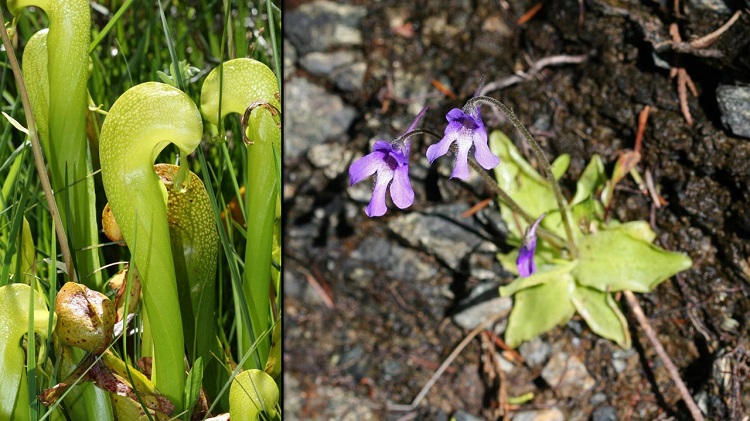Taxa of the Week: carnivorous plants of California

Photo credit: Kristi Lazar
Photo caption: Left: Darlingtonia californica (CNPS List 4), Right: Pinguicula macroceras (CNPS List 2B.2)
Not all carnivores are in the order Carnivora – in fact some are plants! Carnivorous plants are plants that have adapted to trap insects as a nutritional supplement, to compensate for the nutrient-poor soils they usually grow in.
Most people are familiar with the Venus flytrap, which is native to the Carolinas, but there are other pretty cool carnivorous plants growing right under our noses here in California. CNDDB tracks several species of carnivorous plants which you may not have thought to look for in California – one species of sundew (Drosera anglica), one species of butterwort (Pinguicula macroceras), three bladderworts (Utricularia intermedia, U. minor, and U. ochroleuca), and our only native pitcher plant (Darlingtonia californica).
The California pitcher plant has large balloon-like leaves with a tiny exit hole, lined with slippery secretions and downward-pointing hairs, so that any insects unlucky enough to crawl inside cannot find their way out again and eventually die. Sundews and butterworts catch insects by secreting a sticky fluid and digestive enzymes onto their leaves, trapping insects like flypaper. Bladderworts have small round traps with lids growing from modified stems that float in the water or are buried in wet soil. These traps have trigger hairs at the opening so that when small organisms touch the hairs, the lid snaps open and sucks them in!
You can find these plants in the wild in bogs and seeps in the northern Sierras and on the North Coast. And remember to fill out an  Online Field Survey Form if you see one of these neat plants!
Online Field Survey Form if you see one of these neat plants!